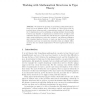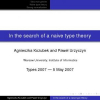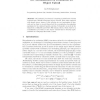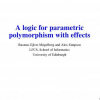TYPES
2007
Springer
13 years 10 months ago
2007
Springer
This paper gives a characterisation, via intersection types, of the strongly normalising terms of an intuitionistic sequent calculus (where LJ easily embeds). The soundness of the ...
TYPES
2007
Springer
13 years 10 months ago
2007
Springer
TYPES
2007
Springer
13 years 10 months ago
2007
Springer
TYPES
2007
Springer
13 years 10 months ago
2007
Springer
This paper presents a new proof language for the Coq proof assistant. This language uses the declarative style. It aims at providing a simple, natural and robust alternative to the...
TYPES
2007
Springer
13 years 10 months ago
2007
Springer
We present a procedure for computing normal forms of terms in Abadi and Cardelli’s functional object calculus. Even when equipped with simple types, terms of this calculus are no...
TYPES
2007
Springer
13 years 10 months ago
2007
Springer
Abstract. Proof erasure plays an essential role in the paradigm of programming with theorem proving. In this paper, we introduce a form of attributive types that carry an attribute...
TYPES
2007
Springer
13 years 10 months ago
2007
Springer
TYPES
2007
Springer
13 years 10 months ago
2007
Springer
TYPES
2007
Springer
13 years 10 months ago
2007
Springer
Abstract. We propose syntax and semantics for systems of intuitionistic and classical first order dependently sorted logic, with and withlity, retaining type dependency, but other...
TYPES
2007
Springer
13 years 10 months ago
2007
Springer
We consider propositional formulas built on implication. The size of a formula is the number of occurrences of variables in it. We assume that two formulas which differ only in th...




